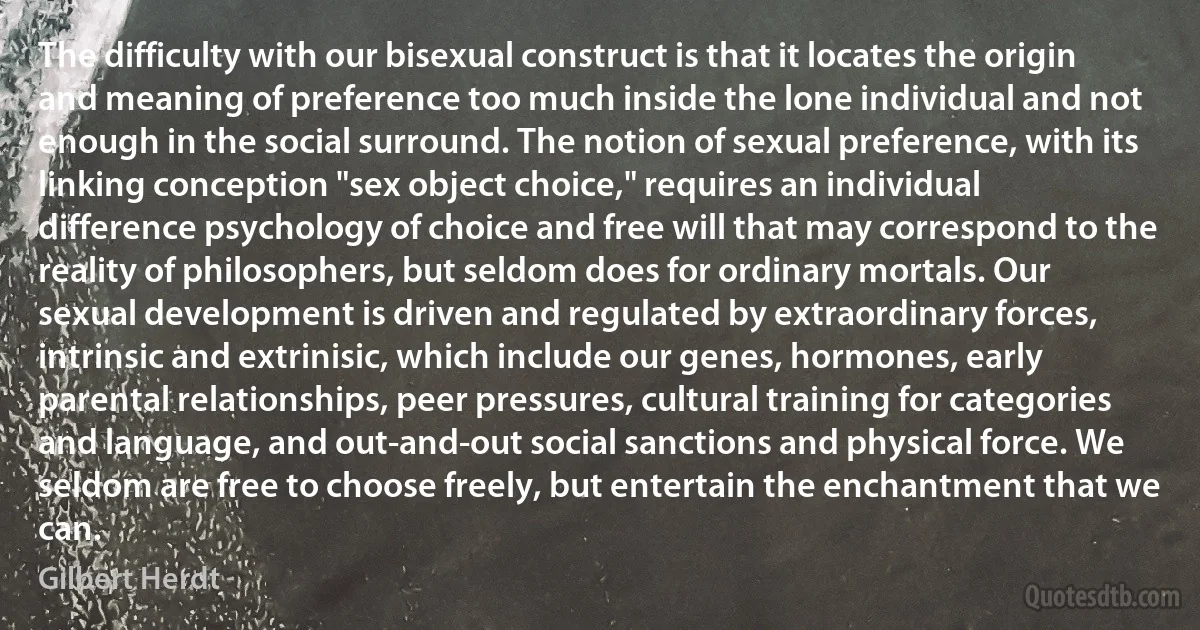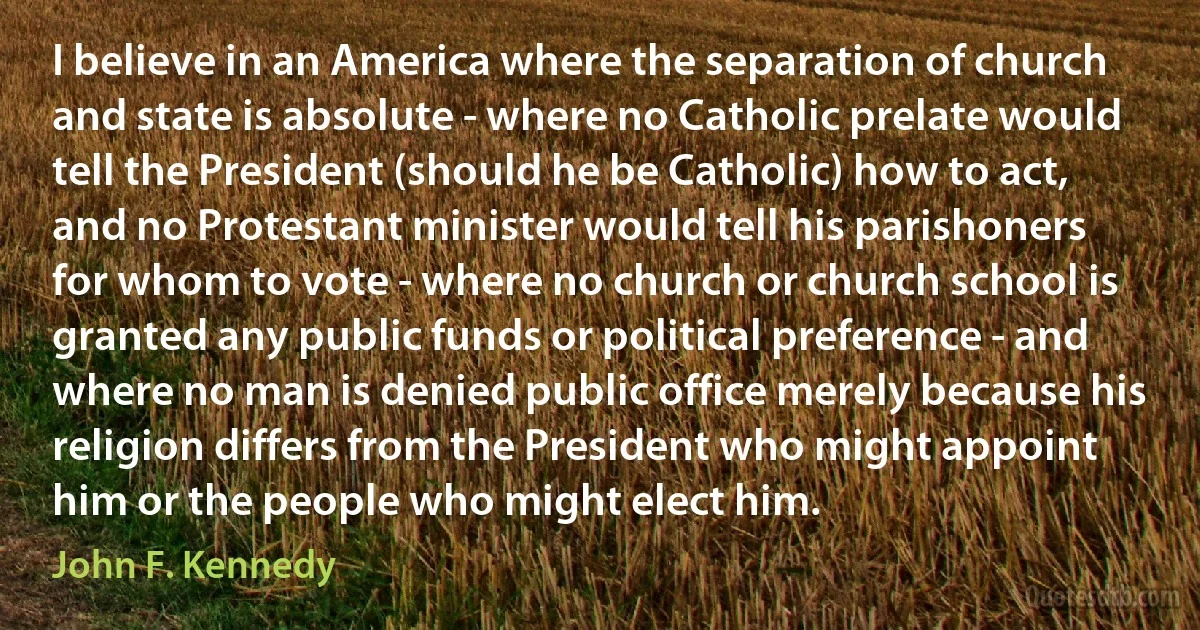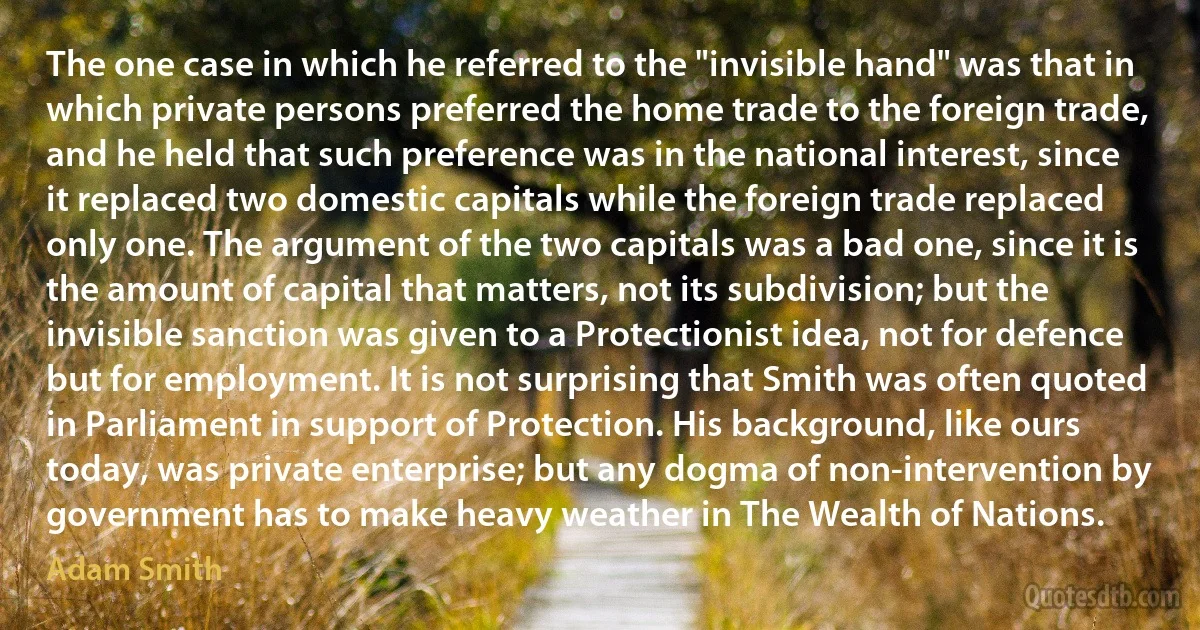Preference Quotes - page 8
I see art-making, especially that which comes from the margins of the mainstream, as a site of resistance, a way of interrupting and intervening in those historical and cultural fields that continually exclude me, a sort of gathering of forces on the borders. For the dominant hegemonic stance that has worked to silence and subdue gender and ethnic difference has also silenced difference based on sexual preference.

Harmony Hammond
Arrow's Impossibility Theorem is quite surprising. It shows that three very plausible and desirable features of a social decision mechanism are inconsistent with democracy: there is no "perfect” way to make social decisions. There is no perfect way to "aggregate” individual preferences to make one social preference. If we want to find a way to aggregate individual preferences to form social preferences, we will have to give up one of the properties of a social decision mechanism described in Arrow's theorem.

Hal Varian
Apple is becoming more and more like a typical tech firm - that is, long on technology and short on magic. ... Apple is drifting closer and closer to where it was back in the 1990s. It offers advancements that largely follow those made by others years earlier, product proliferation, a preference for more over simple elegance, and waning excitement.

Rob Enderle
In short, the NSC staff is becoming increasingly involved in operational issues that should be the purview of Senate-confirmed individuals in the chain of command, and doing so beyond the reach of congressional oversight. If this organization were to return to the intent of the legislation that established it, it could reasonably claim that its strategic functions on behalf of the President are protected by Executive privilege. If, on the other hand, the NSC staff is to play the kind of operational role it has in recent years--and I could give my colleagues example after example--if it is going to play the kind of operational role it has in recent years, then such a body cannot escape congressional oversight. The purpose of the provision in the NDAA to cap the size of the NSC staff is to state a preference for the Congress's original intent in creating the NSC.

John McCain
But already in his early works, as in the still-life of 1893.. ..there is a tendency towards the static and well-balanced arrangement. He has a preference for painting in atmospheric conditions which tend to efface the individual forms and emphasize the general outline: Mondrian: 'I often sketched by moonlight - cows resting or standing immovable in flat Dutch meadows, or houses with dead, blank windows. I never painted these things romantically'.

Piet Mondrian
This (even) broader assertion we make: that even if the Paraclete had in this our day definitely prescribed a virginity or continence total and absolute, so as not to permit the heat of the flesh to foam itself down even in single marriage, even thus He would seem to be introducing nothing of "novelty;” seeing that the Lord Himself opens "the kingdoms of the heavens” to "eunuchs,” as being Himself, withal, a virgin; to whom looking, the apostle also-himself too for this reason abstinent-gives the preference to continence.

Tertullian
I believe that experience demonstrates that a democratic society that recognizes and enforces these basic rights-uncensored expression, freedom of conscience, due process, democracy, and equal protection of the laws-is preferable to a society that does not. That is my case for rights. That is why I have a strong preference for rights.

Alan Dershowitz
If, from the idea of motherland, you take away covetousness, hatred, envy and vainglory; if you take away from it the desire for predominance by violence, what is there left of it?
It is not an individual unity of laws; for just laws have no colors. It is not a solidarity of interests, for there are no material national interests - or they are not honest. It is not a unity of race; for the map of the countries is not the map of the races. What is there left?
There is left a restricted communion, deep and delightful; the affectionate and affecting attraction in the charm of a language - there is hardly more in the universe besides its languages which are foreigners - there is left a personal and delicate preference for certain forms of landscape, of monuments, of talent. And even this radiance has its limits. The cult of the masterpieces of art and thought is the only impulse of the soul which, by general consent, has always soared above patriotic littlenesses.

Henri Barbusse
This eminent painter, whose contempt for the follies of mankind kept pace with his acute observation of them, was so disgusted at the blind preference paid to his powers of portraiture that for many years of his residence at Bath he regularly shut up all his landscapes in the back apartments of his house, to which no common visitors were admitted. The landscape that first found its way into any collection was purchased of him by the late Henry Hoare, Esq., of Stourhead, on a friend's recommendation! and so little even then was the merit of Gainsborough duly estimated that Mr. Bampfylde, a dilettante in painting, being on a visit to Stourhead, offered to mend Gainsborough's sheep by repainting them, and was allowed to do so. They have been restored to their original deficiencies by the taste and good sense of the present possessor of that beautiful place [Sir Richard Colt Hoare ].

Thomas Gainsborough
The people of England are loyal to the House of Hanover, not from a vain preference of one family to another, but from a conviction that the establishment of that family was necessary to the support of their civil and religious liberties. This, Sir, is a principle of allegiance equally solid and rational;-fit for Englishmen to adopt, and well worthy of your Majesty's encouragement. We cannot long be deluded by nominal distinctions. The name of Stuart, of itself, is only contemptible;-armed with the sovereign authority, their principles are formidable. The Prince, who imitates their conduct, should be warned by their example; and, while he plumes himself upon the security of his title to the crown, should remember that, as it was acquired by one revolution, it may be lost by another.

Junius
It's strange-you know, the Net is denounced as austere, the product of the engineering mentality, so forth and so on. It's the most feminine influence that Western civilization has ever allowed itself to fall under the spell of. The troubadors of the fourteenth century were as nothing compared to the boundary-dissolving, feminizing, permitting, nurturing nature of the Net. Maybe that's why there is an overwhelming male preference for it, in its early form, because that's where that was needed. But it is Sophia, it is wisdom, it is the penetrating archetypal female logos of the world-soul, leading us away from what was very sharp-edged and uncomfortable and repressive to our creativity and our sexuality and our relationships to each other and to the Earth.

Terence McKenna
Having lived all my life in a country swarming with messiahs, I have been mistaken, perhaps quite naturally, for one myself, especially by the others. It would be hard to imagine anything more preposterous. I am, in fact, the complete anti-Messiah, and detest converts almost as much as I detest missionaries. My writings, such as they are, have had only one purpose: to attain for H. L. Mencken that feeling of tension relieved and function achieved which a cow enjoys on giving milk. Further than that, I have had no interest in the matter whatsoever. It has never given me any satisfaction to encounter one who said my notions had pleased him. My preference has always been for people with notions of their own. I have believed all my life in free thought and free speech-up to and including the utmost limits of the endurable.

H. L. Mencken



